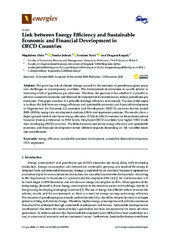Please use this identifier to cite or link to this item:
https://rfos.fon.bg.ac.rs/handle/123456789/2089Full metadata record
| DC Field | Value | Language |
|---|---|---|
| dc.creator | Ziolo, Magdalena | |
| dc.creator | Jednak, Sandra | |
| dc.creator | Savić, Gordana | |
| dc.creator | Kragulj, Dragana | |
| dc.date.accessioned | 2023-05-12T11:29:21Z | - |
| dc.date.available | 2023-05-12T11:29:21Z | - |
| dc.date.issued | 2020 | |
| dc.identifier.issn | 1996-1073 | |
| dc.identifier.uri | https://rfos.fon.bg.ac.rs/handle/123456789/2089 | - |
| dc.description.abstract | The growing risk of climate change caused by the emission of greenhouse gases poses new challenges to contemporary countries. The development of economies is usually related to increasing levels of greenhouse gas emissions. Therefore, the question arises whether it is possible to achieve sustainable economic and financial development and simultaneously reduce greenhouse gas emissions. This paper assumes it is possible if energy efficiency is increased. The aim of the paper is to show the link between energy efficiency and sustainable economic and financial development in Organisation for Economic Co-operation and Development (OECD) countries for the period 2000-2018 by using data envelopment analysis (DEA) and regression analysis. The results show a slight upward trend of total factor energy efficiency (TFEE) in OECD countries for the analysed period; however, there is a difference in TFEE levels. Developed OECD countries have higher TFEE levels than developing OECD countries. The links between total factor energy efficiency and sustainable economic and financial development reveal different impacts depending on the variables taken into consideration. | en |
| dc.publisher | MDPI, Basel | |
| dc.relation | National Science Centre Poland (NCN) [2017/25/B/HS4/02172] | |
| dc.relation | Energies MDPI | |
| dc.rights | openAccess | |
| dc.rights.uri | https://creativecommons.org/licenses/by/4.0/ | |
| dc.source | Energies | |
| dc.subject | sustainable financial development | en |
| dc.subject | sustainable economic development | en |
| dc.subject | regression | en |
| dc.subject | energy efficiency | en |
| dc.subject | DEA | en |
| dc.title | Link between Energy Efficiency and Sustainable Economic and Financial Development in OECD Countries | en |
| dc.type | article | |
| dc.rights.license | BY | |
| dc.citation.issue | 22 | |
| dc.citation.other | 13(22): - | |
| dc.citation.rank | M23 | |
| dc.citation.volume | 13 | |
| dc.identifier.doi | 10.3390/en13225898 | |
| dc.identifier.fulltext | http://prototype2.rcub.bg.ac.rs/bitstream/id/674/2085.pdf | |
| dc.identifier.rcub | conv_2417 | |
| dc.identifier.scopus | 2-s2.0-85101076375 | |
| dc.identifier.wos | 000594320500001 | |
| dc.type.version | publishedVersion | |
| item.cerifentitytype | Publications | - |
| item.fulltext | With Fulltext | - |
| item.grantfulltext | open | - |
| item.openairecristype | http://purl.org/coar/resource_type/c_18cf | - |
| item.openairetype | article | - |
| Appears in Collections: | Radovi istraživača / Researchers’ publications | |
SCOPUSTM
Citations
63
checked on Nov 17, 2025
Page view(s)
8
checked on Dec 28, 2025
Download(s)
2
checked on Dec 28, 2025
Google ScholarTM
Check
Altmetric
This item is licensed under a Creative Commons License


